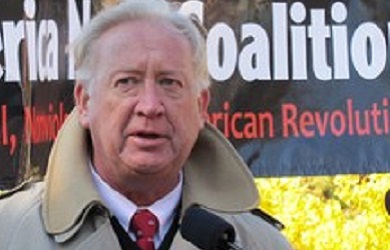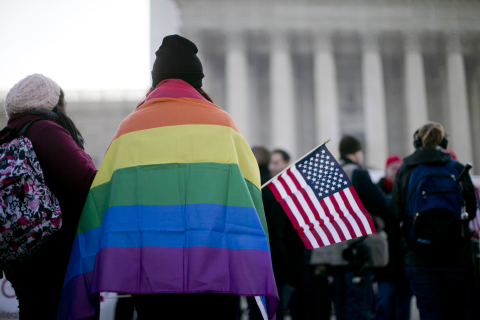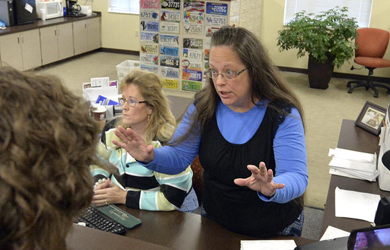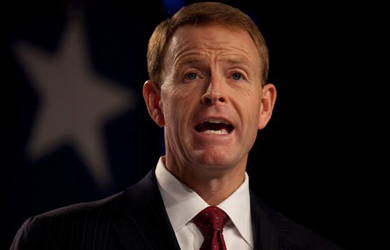Lawyers for Kim Davis are trying to piggyback on the popularity of Pope Francis by revealing that Davis was “sneaked into the Vatican embassy by car” to meet the pope when he visited Washington, D.C., recently. Not exactly a red-carpet welcome, but Davis and Liberty Counsel can use all the P.R. help they can get these days.
Liberty Counsel’s Mat Staver says the visit, grudgingly confirmed by the Vatican, wasn’t arranged through the American bishops. But it would not have been terribly surprising if it were enabled by Archbishop William Lori, point man for the U.S. bishops’ strategy of using religious liberty claims to resist LGBT equality and the contraception coverage requirement under the Affordable Care Act.
On the Friday before the pope’s arrival in Washington, D.C., Lori gave the keynote to a day-long “Religious Freedom Summit” at the Catholic University of America’s law school. Much of the day was devoted to discussion of horrific religious persecution in other parts of the world, including anti-Christian persecution in Syria and China. Those harrowing first-person accounts made it hard to consider claims of “religious persecution” by people like Kim Davis as even remotely in the same category.
Even among the conservative lawyers who filled the room, support for Davis wasn’t unanimous. The closing address at the conference was given by Ken Starr — yes, that Ken Starr — who is now president of Baylor University, a Texas-based Christian college with Baptist heritage.
Starr talked about how courts have wrestled with the words of the First Amendment for some 80 years, and proposed some key principles that he said should guide the law: non-coercion in matters of conscience; nondiscrimination against religion; government’s ability, within limits, to provide affirmative protections for religious belief; and government noninterference with the mission and governance of religious organizations.
Starr acknowledged that in implementing many of these principles there are lines that must be drawn. For example, he explained, the majority and dissenters in the Hobby Lobby case gave different weight to the religious liberty claims of the company’s owners and the potential for demonstrable harm to the company’s employees. How we identify and measure recognizable harm to third parties, and weigh it against free exercise, will continue to be wrestled with in the courts, he said, suggesting that there were probably differing opinions even among the people in the room.
Which brings us to Kim Davis, and other Religious Right martyrs-in-the-making such as bakers and florists who refuse service to same sex couples.
First, Davis:
I don’t think that this question is easy. Others may, and the freedom of conscience simply trumps all. But the reason I think it’s not easy is because she is a public official who has taken an oath to uphold the law. I know, I heard the panel saying, look at all the exceptions to individuals who’ve been sworn to uphold the law and who have chosen not to do it. I personally find that a little uncomfortable. Oh, you’re going to pick and choose which laws to enforce.
He asked whether people in the room would be okay with a sheriff or chief of police deciding which laws to enforce based on their personal beliefs.
Starr then addressed conversations about accommodations for bakers and florists who refuse to serve gay customers:
Not a public official like Kim Davis, a private citizen. But at the same time I’m going to suggest that we really think hard on this. She is one who has opened her bakery or catering service or floral shop to business. She has a license from the state to do business. And in carrying out a commercial business, the general rule is one akin to principle two of nondiscrimination. That rule is deeply anchored in the common law. You’ve got to serve people who come in to you. And also the public accommodation provisions of the 1964 Civil Rights Act when folks were excluded from service on grounds of race. The very idea and ideal of the common law rule is equality — you take care of every customer who comes to you unless you have a very substantial — they’re trying to tear up my shop.
Starr noted that there’s plenty of litigation in these areas, and that some “creative” arguments are being mounted by those suggesting that wedding services such as cakes and flowers are protected as a freedom of speech issue. (That kind of claim was made unsuccessfully by a photographer in New Mexico, discussed in PFAW’s “Religious Liberty: Shield or Sword?”)
Starr also noted that “we are an increasingly diverse community of men, women and children who come from so many cultures and traditions …The world we inhabit is a pluralistic one.” He acknowledged that his four principles won’t magically resolve differences on these issues, suggesting that those involved should adhere to another organizing principle, the Golden Rule, and treat those with whom they disagree with kindness, dignity, and respect.
Starr isn’t the only conservative lawyer taking issue with the claims of Kim Davis and her supporters. Ken Klukowski said earlier this month that Davis was on “very shaky legal ground” and that her refusal to allow deputy clerks to issue marriage licenses was an indefensible effort to force other civil servants to act in conformity with her religious beliefs.








